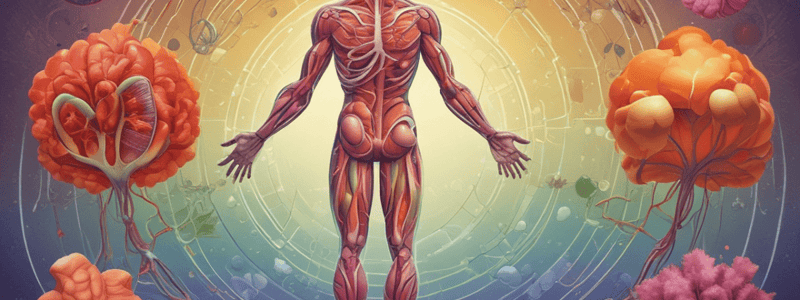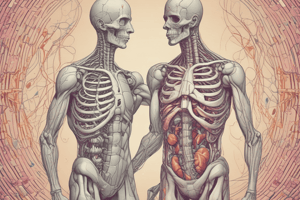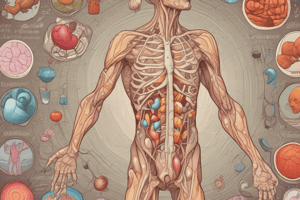Podcast
Questions and Answers
What percentage of body weight is typically water in a young adult male?
What percentage of body weight is typically water in a young adult male?
Approximately 60%
What is the approximate percentage of water in lean muscle tissue?
What is the approximate percentage of water in lean muscle tissue?
About 73%
What is the role of water in regulating body temperature?
What is the role of water in regulating body temperature?
It helps in regulating body temperature and acid-base balance (proper blood pH)
What is the difference in water content between fat tissue and lean muscle tissue?
What is the difference in water content between fat tissue and lean muscle tissue?
What is a unique characteristic of water compared to other nutrients?
What is a unique characteristic of water compared to other nutrients?
What is the function of water in digesting food?
What is the function of water in digesting food?
What is the role of water as a solvent in the body?
What is the role of water as a solvent in the body?
What is the percentage range of body weight that is typically water?
What is the percentage range of body weight that is typically water?
What is the primary function of water in the human body?
What is the primary function of water in the human body?
What is simple diffusion, and how does it occur?
What is simple diffusion, and how does it occur?
What is osmosis, and how does it differ from simple diffusion?
What is osmosis, and how does it differ from simple diffusion?
What is the difference between intracellular fluid and extracellular fluid?
What is the difference between intracellular fluid and extracellular fluid?
How does the body control the passage of substances through its plasma membrane?
How does the body control the passage of substances through its plasma membrane?
What is the significance of the plasma membrane in cellular functions?
What is the significance of the plasma membrane in cellular functions?
How does excess body fat affect the body's ability to regulate temperature?
How does excess body fat affect the body's ability to regulate temperature?
What is the role of water in maintaining proper blood pH?
What is the role of water in maintaining proper blood pH?
What is the significance of water-soluble substances in cellular functions?
What is the significance of water-soluble substances in cellular functions?
How does the concentration of substances dissolved in water influence osmosis?
How does the concentration of substances dissolved in water influence osmosis?
What is the primary way the body maintains the balance of compartmental fluids and proper hydration?
What is the primary way the body maintains the balance of compartmental fluids and proper hydration?
What type of ions conduct electricity in the body?
What type of ions conduct electricity in the body?
Which ions are responsible for maintaining intracellular fluid volume?
Which ions are responsible for maintaining intracellular fluid volume?
What happens to cells when there is an excess of sodium ions in extracellular fluid?
What happens to cells when there is an excess of sodium ions in extracellular fluid?
What is edema, and where does it occur?
What is edema, and where does it occur?
What factors influence individual water requirements?
What factors influence individual water requirements?
What is the Adequate Intake (AI) for total water intake for young women?
What is the Adequate Intake (AI) for total water intake for young women?
What percentage of total water intake comes from solid foods?
What percentage of total water intake comes from solid foods?
What is the approximate water content of fruits and vegetables by weight?
What is the approximate water content of fruits and vegetables by weight?
What happens when extracellular fluid has fewer than normal sodium ions?
What happens when extracellular fluid has fewer than normal sodium ions?
What is the primary mechanism by which the body eliminates unabsorbed water from the digestive tract?
What is the primary mechanism by which the body eliminates unabsorbed water from the digestive tract?
What is the approximate daily amount of water consumed and produced by an average healthy adult?
What is the approximate daily amount of water consumed and produced by an average healthy adult?
What is the term for the process by which perspiration evaporates into the air to cool the body?
What is the term for the process by which perspiration evaporates into the air to cool the body?
What is the term for body water that diffuses through the layers of skin or is exhaled from the lungs?
What is the term for body water that diffuses through the layers of skin or is exhaled from the lungs?
What is the primary function of the kidneys in maintaining proper hydration?
What is the primary function of the kidneys in maintaining proper hydration?
What is the main component of urine?
What is the main component of urine?
What is the term for a hard mass formed by minerals and waste products settling out of urine?
What is the term for a hard mass formed by minerals and waste products settling out of urine?
What increases the likelihood of forming kidney stones?
What increases the likelihood of forming kidney stones?
What is the term for a substance that increases urine production?
What is the term for a substance that increases urine production?
What is the temporary effect on body weight after consuming salty foods and beverages?
What is the temporary effect on body weight after consuming salty foods and beverages?
How does caffeine affect urine production, and what is the significance of this effect?
How does caffeine affect urine production, and what is the significance of this effect?
What is the role of antidiuretic hormone (ADH) in maintaining fluid balance in the body?
What is the role of antidiuretic hormone (ADH) in maintaining fluid balance in the body?
How does aldosterone help maintain fluid balance in the body?
How does aldosterone help maintain fluid balance in the body?
What is a simple way to determine if you are consuming enough water, and what does the color of your urine indicate?
What is a simple way to determine if you are consuming enough water, and what does the color of your urine indicate?
What is the relationship between alcohol consumption and dehydration?
What is the relationship between alcohol consumption and dehydration?
How do congeners in alcoholic drinks contribute to hangovers?
How do congeners in alcoholic drinks contribute to hangovers?
What is the primary way in which the body loses fluid, and what does this mean for overall fluid balance?
What is the primary way in which the body loses fluid, and what does this mean for overall fluid balance?
How do hormones like ADH and aldosterone help the body respond to dehydration?
How do hormones like ADH and aldosterone help the body respond to dehydration?
What is the significance of the posterior pituitary gland in maintaining fluid balance?
What is the significance of the posterior pituitary gland in maintaining fluid balance?
How does the body's immune response contribute to the experience of a hangover?
How does the body's immune response contribute to the experience of a hangover?
What is the primary regulator of fluid intake, and how does it work?
What is the primary regulator of fluid intake, and how does it work?
Why are older adults more susceptible to dehydration, and what can be done to mitigate this?
Why are older adults more susceptible to dehydration, and what can be done to mitigate this?
What is the significance of staying hydrated for individuals who work or exercise outdoors, especially in hot conditions?
What is the significance of staying hydrated for individuals who work or exercise outdoors, especially in hot conditions?
What type of solutions may be necessary for individuals who are sick, especially children with fever, vomiting, diarrhea, and increased perspiration?
What type of solutions may be necessary for individuals who are sick, especially children with fever, vomiting, diarrhea, and increased perspiration?
What can happen if an excessive amount of water is consumed in a short time period, and what are the signs and symptoms of water intoxication?
What can happen if an excessive amount of water is consumed in a short time period, and what are the signs and symptoms of water intoxication?
What percentage of body weight loss in fluids can lead to fatigue and thirst, and what is the significance of this?
What percentage of body weight loss in fluids can lead to fatigue and thirst, and what is the significance of this?
What happens to muscle strength and endurance as body water loss approaches 4% of body weight, and what is the significance of this?
What happens to muscle strength and endurance as body water loss approaches 4% of body weight, and what is the significance of this?
What is the significance of having access to drinkable water during natural disasters such as hurricanes, and why is it crucial for survivors?
What is the significance of having access to drinkable water during natural disasters such as hurricanes, and why is it crucial for survivors?
What happens when body weight is reduced by 7-10% as a result of body fluid losses, and what is the significance of this?
What happens when body weight is reduced by 7-10% as a result of body fluid losses, and what is the significance of this?
What is the consequence of a 20% reduction of body weight due to body fluid losses, and what is the significance of this?
What is the consequence of a 20% reduction of body weight due to body fluid losses, and what is the significance of this?
Flashcards are hidden until you start studying
Study Notes
Water's Functions in the Body
- Water makes up 50-75% of a person's body weight, with lean muscle tissue containing more water (73%) than fat tissue (20%).
- Water is a solvent that dissolves many body substances, including glucose.
- Water participates directly in chemical reactions, such as those involved in digesting food.
- Water transports substances, removes waste products, lubricates tissues, and regulates body temperature and acid-base balance.
- Water is a major component of body fluids, including blood, saliva, sweat, tears, mucus, and joint fluid.
Membrane Transport
- Water helps cells obtain materials from their environment and eliminate wastes through simple diffusion and osmosis.
- Simple diffusion occurs when substances move from an area of high concentration to an area of low concentration.
- Osmosis is the diffusion of a solvent (water) through a selectively permeable membrane.
Body Fluid
- The body has two major fluid compartments: intracellular fluid (inside cells) and extracellular fluid (outside cells).
- About two-thirds of the body's water is in the intracellular fluid compartment.
- Water is exchanged between plasma and tissue fluid, as well as between tissue and intracellular fluids.
Electrolytes and Fluid Balance
- Electrolytes (ions) such as sodium, calcium, potassium, magnesium, chloride, phosphate, and sulfate help maintain fluid balance.
- The balance of compartmental fluids and proper hydration is maintained by controlling ion concentration in each fluid compartment.
- Changes in ion concentrations can cause water to shift out of one compartment and into another.
Sources of Water
- There is no "rule of thumb" recommendation for how many glasses of water to consume each day.
- Factors such as environmental temperatures, health conditions, physical activities, and dietary choices influence individual water requirements.
- The Adequate Intake (AI) for total water intake is approximately 11 cups (2.7 L) for young women and 15.5 cups (3.7 L) for young men.
- About 80% of total water intake comes from water and other beverages, while food supplies the remaining amount.
Daily Water Balance
- An average healthy adult consumes and produces approximately 2.6 quarts (2500 ml) of water daily.
- The body eliminates about 2.6 quarts of water in urine, exhaled air, feces, and perspiration.
- Factors such as temperature, humidity, and altitude can affect body water losses.
Kidneys and Hydration
- The kidneys are the major regulator of the body's water content and ion concentrations.
- Kidneys maintain proper hydration by filtering excess ions and water from blood.
- Water is the main component of urine, and kidneys excrete excess water in urine.
Dehydration
- Dehydration occurs when the body loses more water than it takes in.
- Dehydration can be caused by factors such as excessive sweating, diarrhea, vomiting, and diuretics like caffeine.
- Symptoms of dehydration include dark-colored urine, fatigue, and thirst.
- Severe dehydration can lead to coma and death.
Water Conservation
- The body tries to conserve water when it is dehydrated by producing antidiuretic hormone (ADH) and aldosterone.
- ADH stimulates the kidneys to conserve water, while aldosterone reduces the elimination of sodium in urine.
- The body's mechanisms to balance its water content involve the kidneys, pituitary gland, and adrenal glands.### Tropical Cyclones and Hurricanes
- Residents of the southeastern United States, Gulf of Mexico, and Caribbean Sea islands should prepare for tropical cyclones, especially hurricanes.
- The annual hurricane season for these regions starts on June 1 and lasts until November 30.
Devastating Effects of Hurricanes
- Major hurricanes have killed thousands of people and devastated parts of several Caribbean islands, including Haiti, Puerto Rico, the Bahamas, and the Dominican Republic.
- Access to drinkable water is crucial for survivors, as people can die from dehydration within a few days.
Water Intoxication
- There is no Upper Level (UL) for water.
- Water intoxication occurs when excessive water is consumed in a short time or the kidneys have difficulty filtering water from blood.
- Excess water dilutes sodium concentration in blood, causing hyponatremia.
- Water imbalance leads to water moving into cells, including brain cells.
- Symptoms of water intoxication include drowsiness, nausea, vomiting, confusion, coordination problems, and weight gain.
- If left untreated, water intoxication can lead to coma and death.
At-Risk Groups
- Endurance athletes, such as cyclists, triathletes, and marathon runners, who consume large amounts of plain water during competition are at risk of water intoxication.
- People with disorders that interfere with kidney function are also at risk.
- Healthy people rarely drink enough water to become intoxicated.
Studying That Suits You
Use AI to generate personalized quizzes and flashcards to suit your learning preferences.




